Ghostbird to premiere YouTube channel with performance of Barry Cavin’s ‘Ori’
 On August 7, Ghostbird Theatre Company will present a YouTube video performance of a play that FGCU Theatre Professor and Ghostbird Artistic Director Barry Cavin intended for the Calusa Nature Center, Ori. But along came the pandemic, and the play had to be performed in an abandoned village. The YouTube event is the video record of that performance.
On August 7, Ghostbird Theatre Company will present a YouTube video performance of a play that FGCU Theatre Professor and Ghostbird Artistic Director Barry Cavin intended for the Calusa Nature Center, Ori. But along came the pandemic, and the play had to be performed in an abandoned village. The YouTube event is the video record of that performance.
Ori is the latest from the mind of Barry Cavin, a prolific playwright whose credits include more than 40 plays, including Ibb and Writing Shadows (performed in the historic Landford-Kingston Home), No. 27 (presented at Shangri-La Springs in Bonita), and 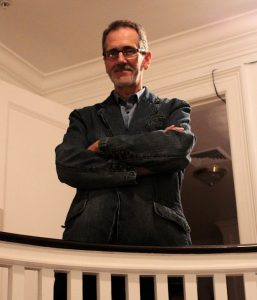 ORBS! and The Perfect Island of Dr. Teed (performed at Koreshan State Park in Estero), all produced and performed by Ghostbird Theatre Company.
ORBS! and The Perfect Island of Dr. Teed (performed at Koreshan State Park in Estero), all produced and performed by Ghostbird Theatre Company.
Ghostbird is known nationwide for site-specific experimental productions. Ori was designed to carry on this tradition by being performed under the stars in the night sky projected above the heads of the actors and audience inside the Calusa Nature Center Planetarium.
“One of our main points of focus at Ghostbird is to tell stories in situ,” Cavin underscores.
 “We believe that art expresses itself more powerfully if it lives as a part of its surroundings and that an ephemeral community inhabiting that same place has a greater appreciation of the expression when it is subjected to that power.”
“We believe that art expresses itself more powerfully if it lives as a part of its surroundings and that an ephemeral community inhabiting that same place has a greater appreciation of the expression when it is subjected to that power.”
In Ori’s case, the play takes its inspiration from a line of dialogue provided by the brilliant playwright Samuel Beckett, in which he suggests that we are left “… to shrink on an impossible earth under an indifferent heaven.”
Or to paraphrase Cavin, we are tiny beings racing through an indifferent universe on a puny planet that’s part of an insignificant galaxy.
“And 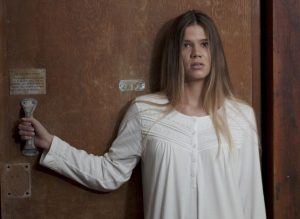 sometimes we feel lost and adrift,” Cavin add. “Sometimes we feel trapped.”
sometimes we feel lost and adrift,” Cavin add. “Sometimes we feel trapped.”
Who doesn’t feel insignificant, trapped and adrift in the midst of the pandemic, characterized as it is by shut-downs, quarantines, soaring positive case and infection rates, escalating hospitalizations and deaths, and an uncertainty that seems amplified daily, if not hourly, by events which seem largely 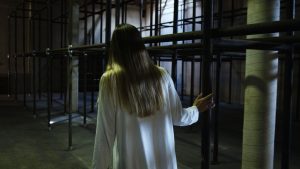 beyond our control.
beyond our control.
Ori takes place on a dying island that has been abandoned by all except four of its inhabitants. The central figure is Miriam (Shelbie Tyndall), a woman who is being held captive “for her safety.” Her sister, Jordan (Lauren Tindle), and nurse (Gabby Kadoo) 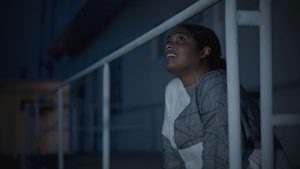 are trying to convince her to leave on the last boat, but standing in her way is a man named Adam (Emory Cavin), who is Miriam’s love interest.
are trying to convince her to leave on the last boat, but standing in her way is a man named Adam (Emory Cavin), who is Miriam’s love interest.
Everyone can identify with Miriam. We’re all conflicted when it comes to change. No matter how unsatisfying or 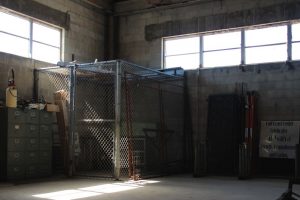 precarious our current condition (be it family circumstance or job), we often cling stubbornly to the status quo rather than confront our fear of the unknown.
precarious our current condition (be it family circumstance or job), we often cling stubbornly to the status quo rather than confront our fear of the unknown.
“We all star gaze in wonder of what may be out there,” Cavin muses. “Some of us dream of being one of the five hundred [people who’ve floated around in space].”
But  if we had a free ticket, would we actually have the courage to hop aboard a SpaceX, Blue Origin or Virgin Galactic spaceship for a ride into outer space? [From the comfort of home, two-in-five Americans and 63 percent of Millennials (born 1981 to 1996) claim they’d love to travel into outer space. But if money were no object …..]
if we had a free ticket, would we actually have the courage to hop aboard a SpaceX, Blue Origin or Virgin Galactic spaceship for a ride into outer space? [From the comfort of home, two-in-five Americans and 63 percent of Millennials (born 1981 to 1996) claim they’d love to travel into outer space. But if money were no object …..]
To  accentuate the dichotomy between the security of home (no matter how humble it may be) and the tug of new adventure, Cavin envisioned having Ori performed under Planetarium-projected stars in the night sky. But that backdrop makes no sense in the digital format now necessitated by the prohibition on live performances. So Cavin has opted to move in a completely different direction.
accentuate the dichotomy between the security of home (no matter how humble it may be) and the tug of new adventure, Cavin envisioned having Ori performed under Planetarium-projected stars in the night sky. But that backdrop makes no sense in the digital format now necessitated by the prohibition on live performances. So Cavin has opted to move in a completely different direction.
No, 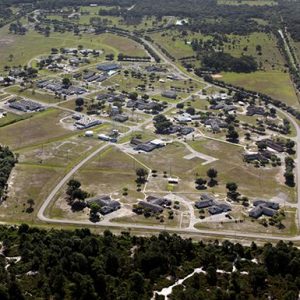 he didn’t find an uninhabited island somewhere.
he didn’t find an uninhabited island somewhere.
He found an abandoned village!
And not just any abandoned village. He took his cast along with Emory and Ashliegh Lucas (who traded off doing camera and sound) to the Buckingham Complex, which Florida Gulf Coast University acquired in 2010 from the State of Florida as a surplus land donation. It’s a 500-acre stretch of old buildings from the 1950s that was operated as an asylum for patients 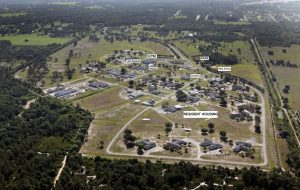 with “developmental disabilities” ranging from mental retardation to bipolar disorders. Opening under the name of Sunland Training (and later Gulf Coast Center), the facility’s goal was to house patients in suburban-style residential homes in a self-contained community or village. But
with “developmental disabilities” ranging from mental retardation to bipolar disorders. Opening under the name of Sunland Training (and later Gulf Coast Center), the facility’s goal was to house patients in suburban-style residential homes in a self-contained community or village. But 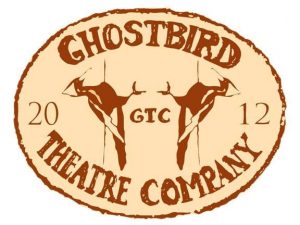 the complex was closed in 2000 following a class action lawsuit filed by the Advocacy Center for Persons with Disability following reports of unexplained deaths and allegations of “disturbing and saddening” neglect and abuse, which included residents suffering fractures at four times the rate experienced by noninstitutionalized people. [Buckingham Complex a/k/a Gulf Coast Center is the subject of a fascinating 8-minute documentary lensed by local filmmaker Tyler Shore, which you can access here.]
the complex was closed in 2000 following a class action lawsuit filed by the Advocacy Center for Persons with Disability following reports of unexplained deaths and allegations of “disturbing and saddening” neglect and abuse, which included residents suffering fractures at four times the rate experienced by noninstitutionalized people. [Buckingham Complex a/k/a Gulf Coast Center is the subject of a fascinating 8-minute documentary lensed by local filmmaker Tyler Shore, which you can access here.]
FGCU has yet to decide what it wants to do with the site and for the present it’s “a place that society has fast forgotten.” This quality – where the buildings remain largely in their original state – not only works well with the themes implicated by the play, it cloaks the venue with an other-worldly aura that evokes parallels to Rod Serling’s The Twilight Zone, particularly On Thursday We Leave for Home, in which a struggling colony on a distant inhospitable planet eagerly awaits the arrival of a ship that will take them back to Earth to the chagrin of their leader, William Benteen, who refuses to go and, as a result, is left to shrink on an impossible planet under an indifferent heaven.
But Ori is not science fiction, and it is neither a television episode nor a movie production. It is a site-specific performance of a play that was performed on location over a span of five days that has been captured and preserved on film – a film which, coincidentally, will premiere Ghostbird Theatre Company’s brand new YouTube Channel, which Cavin is creating even as you read this.
“Everyone will be able to see it as it’s released at a specific time and date … [so] it’ll be like more like a live event that way,” states Cavin, who has built a reputation for intellectually stimulating and challenging characters and storylines.
The screening is tentatively set for 7:00 p.m. on August 7.
Stay tuned for further details.
July 25, 2020.














 Tom Hall is both an amateur artist and aspiring novelist who writes art quest thrillers. He is in the final stages of completing his debut novel titled "Art Detective," a story that fictionalizes the discovery of the fabled billion-dollar Impressionist collection of Parisian art dealer Josse Bernheim-Jeune, thought by many to have perished during World War II when the collection's hiding place, Castle de Rastignac in southern France, was destroyed by the Wehrmacht in reprisal for attacks made by members of the Resistance operating in the area. A former tax attorney, Tom holds a bachelor's degree as well as both a juris doctorate and masters of laws in taxation from the University of Florida. Tom lives in Estero, Florida with his fiancee, Connie, and their four cats.
Tom Hall is both an amateur artist and aspiring novelist who writes art quest thrillers. He is in the final stages of completing his debut novel titled "Art Detective," a story that fictionalizes the discovery of the fabled billion-dollar Impressionist collection of Parisian art dealer Josse Bernheim-Jeune, thought by many to have perished during World War II when the collection's hiding place, Castle de Rastignac in southern France, was destroyed by the Wehrmacht in reprisal for attacks made by members of the Resistance operating in the area. A former tax attorney, Tom holds a bachelor's degree as well as both a juris doctorate and masters of laws in taxation from the University of Florida. Tom lives in Estero, Florida with his fiancee, Connie, and their four cats.